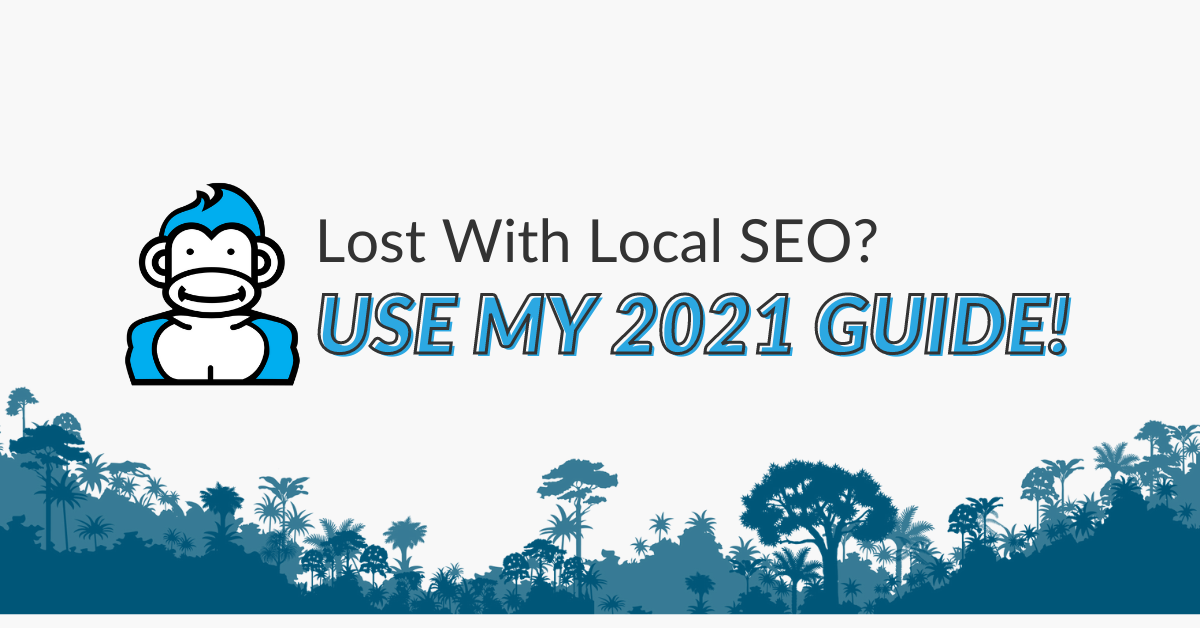Local SEO Audits Time-Saving Local SEO Guide
Want to learn about local SEO, but don’t have a lot of time? This is the Local SEO Guide for you. Learn from a local SEO expert how you can be successful – in less time.
What follows is 10+ years of local SEO knowledge and experience in a guide you can read in 20 minutes. Put the insights gained from 1,000+ local SEO audits to work for you today!
Local SEO Guide Table of Contents
What is Local SEO?
Oh no, more lingo! Learn what is meant when people say, “Local SEO” (Don’t worry it’s easy to understand!)
SEO, short for search engine optimization, is a set of search marketing strategies and tactics that make it easier for potential customers to find your website when they search for something related to it (I.E. what you do, sell, or offer). SEO is one of the most popular ways to generate traffic to your website, and of course get more leads, sales, and revenue. This is because unlike advertising, you do not pay for every click or impression.
Local SEO is a subset of search engine optimization (SEO). Local SEO is a set of strategies and tactics that help ensure your website appears highly for localized searches. It has become more important in the last five years as search engines have introduced new search engine result page (SERP) layouts.
Google and other search engines recognize that for many search queries (I.E. healthcare providers, home and professional services, hospitality, restaurants, etc) customers typically want a provider that is close to their home. As a result, Google et al have changed their search engine results pages (SERPs) to cater to these types of searches by showing results consisting of nearby businesses.
Localized search results are visually characterized by the appearance of a map, and a listing of three to four businesses underneath, at the top of the page (usually below the Google Ads). This area is commonly referred to as the, “maps and local pack,” respectively by Local SEO Consultants. Achieving higher rankings and visibility in this area requires a different set of strategies from traditional SEO.
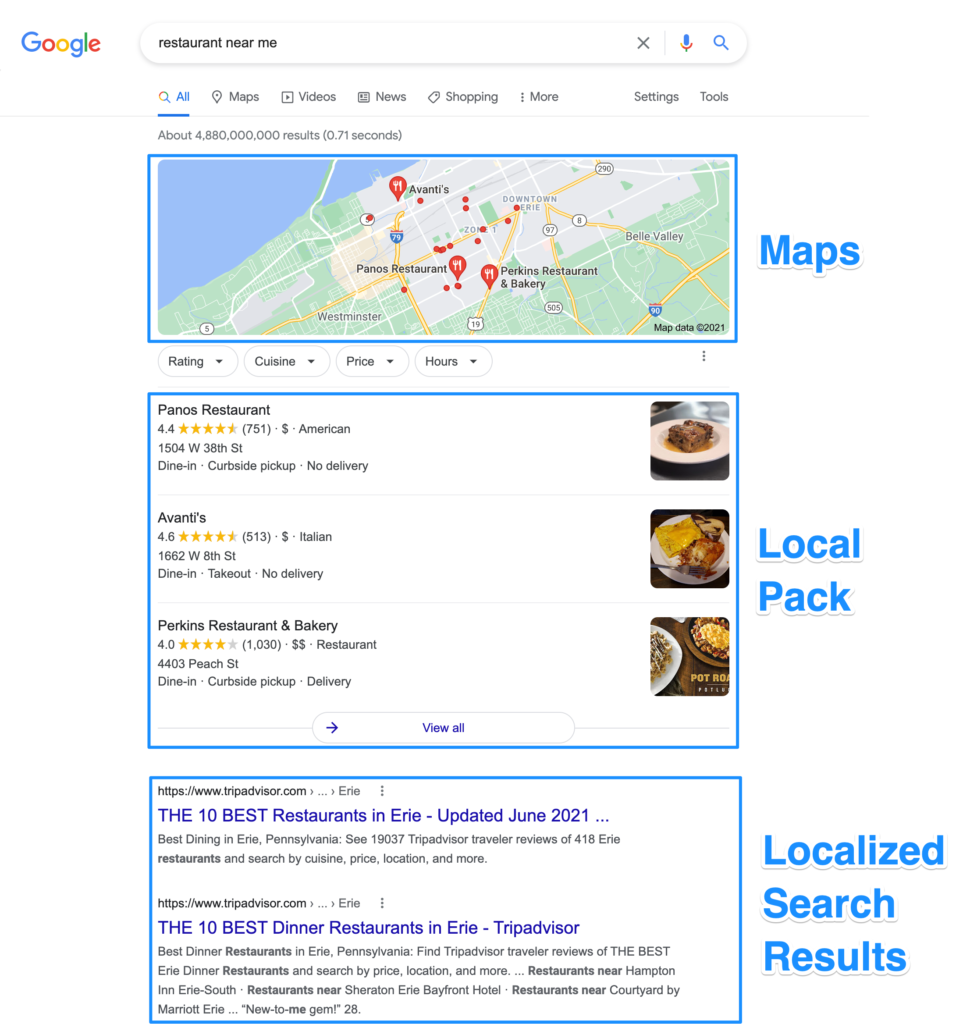
These localized results also show traditional organic search results. For many of these queries the results return links to websites in the intended geography. This means that important organic search tactics such as link building are still important for local SEO.
A good example of this is to go to Google and search “Restaurants Near Me” or “Dentists Near Me” to get an idea of what a localized SERP looks like. Even product searched return results showing products that are available from a nearby retailer!
Now to really experience what your customers are doing, type in your industry or specialty and see what appears! This will give you a great idea of what your potential customers are seeing. Also feel free to search your brand or trade name.
Why local SEO is important
These are the major reasons why local SEO is important to you and your search marketing efforts.
Similar to the search you just did for yourself, instead of pulling out the yellow pages, or asking a friend for recommendation when in need of a solution, your customers are turning to search engines to find a business like yours when they need them.
The largest of the big three search engines, Google is the main starting point for the majority of customer discovery online (outside of ecommerce, where Amazon can stake a claim as the starting point for finding products).

From 2015-2017 there was a 900% increase in “near me” searches on Google. This explosion was brought on by the continued increase in mobile phone usage. A major cause for Google shifting the SERPs to show the local pack and maps, as well as nearby businesses in the organic results.
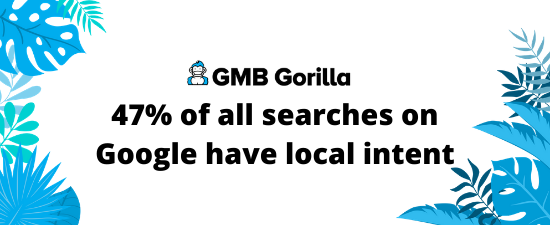
Today almost half (46%) of all Google searches are looking for a local business. It seems customers want a pizza place in their neighborhood; not one five states away. Google knows this and has adjusted their results to reflect what the majority of customers want (and don’t forget what benefits Google).
What’s more, the majority of customers visiting your website don’t come from paid ads, social media, or referrals. Believe it or not, well over 90% of all Internet users conduct a search at least once a week. This means they’re heading to Google first and probably seeing your Google My Business (GMB) profile or clicking on a search result for your website before actually typing in your web address.
In fact, an average of sixty-four percent of your potential customers online come from organic search results, meaning they typed a search term into Google, and your website appeared in the results.
This makes local SEO one of the largest drivers of new customers for businesses. It’s also one of the marketing channels with the highest ROI since you can often front load your efforts and enjoy longer term benefits with minimal maintenance (although this is starting to change as SEO continues to get harder and Google takes over more of the screen real estates with ads and their own properties).
What is the difference between SEO and Local SEO?
SEO can be confusing. Here’s what you need to know about these two search marketing channels.
The difference between local SEO, and regular SEO, is that with local SEO, search engines like Google take in account a different set of ranking factors in determining who is #1. In the past, appearing highly for search phrases required you to focus on having a well optimized, modern, website that had high quality backlinks.
As a result of the switch to showing localized SERPs for those queries that indicate a nearby solution is desirable, Google et al are using a different set of factors to determine who ranks #1 on the map and the local pack. These local SEO ranking factors include:
- A searchers location at the time of the search,
- Proximity of the searcher to your business location (as determined by your GMB address),
- Quality of your Google My Business (GMB) profile,
- Volume and rating of your GMB reviews,
- And the authority of the website associated with GMB profile
All of this means businesses and marketers need to pay attention to a number of off-page SEO factors that they may not have had to address in the past. Since Google uses the information found on your GMB profile to power maps and local pack results, it also makes managing and optimizing your GMB profile important.
Don’t forget that traditional SEO tactics, such as on-page optimization, and link building are important to rank highly in the localized organic section of SERPs. If you execute on strategies designed to target both local pack/maps, and the organic results, you have a chance of appearing at least twice in each SERP. The more listings you have on the SERP, the more likely you are to get clicks (and sales)!
Local SEO is still an emerging area of search marketing, so there is a tremendous opportunity to win additional customers, and stay ahead of your competitors today. This is especially true as Google and other search engines continue to deliver more and more localized search results.
How much does Local SEO cost?
You want to start doing local SEO, but you are not sure how much it will cost? It will cost this much…
The short answer is “it depends.”
Doing it yourself?
If you want to do it yourself, of course you first have to have an interest, and then time, to learn how to do local SEO effectively. You will spend a lot of time upfront, which is expensive but over time, you should be able to better leverage your time and reduce the amount spent on local SEO, which can be very cost effective.
Hiring someone else to do it?
If you want to hire someone, you are going to spend more money out of pocket, over a longer period of time. You may lack time, and or the interest in gaining local SEO expertise, so this might actually be a cheaper option for you.
How many services and or products do you effort need to support?
The amount of money (and or time) you will need to invest into local SEO will depend on the number of products and services you are trying to promote. The more products and services, the more it will cost because it will require more resources to execute. If you’re just getting started with local SEO, start with one product, service, or location, then add on over time.
Targeting only one location and geography, or multiple locations and cities?
Similar to the number of products or services you wish to promote, the number of locations (offices, clinics, retail storefronts) you wish to promote will determine the cost of local SEO services. The more locations that need to be promoted, the more you should expect to pay.
Many agencies and consultants will charge you based on the number of locations, products, and or services you want their efforts to support. (The same goes for products and services, in many cases.) This is something you should know going into any pricing conversations.
Local SEO Consultant
Best option for smaller businesses or for when you are just getting started with local SEO and want to set a great foundation. This is often a great place to begin if your goal is do the work yourself, or build an in-house team in the future.
Expect to pay between $75 and $200+ per hour depending on experience, expertise, and your market.
Don’t let cost fool you though; more expensive does not always mean better. Ask for case studies and references.
Pros
- Get direct access to high level expertise in a short amount of time
- Great for audits, one time optimizations, and or on-going direction of execution
- Avoid the overhead costs associated with agencies or in-house professionals
- Allows for better knowledge transfer (I.E. you can learn more by working directly with them and you can use this knowledge to DIY in future)
Cons
- Wide range in costs, experience, and expertise
- Can get expensive if working on an hourly basis
- Often difficult to vet and verify their expertise, since everyone starts to sound “the same”
- Consultants are often limited in their ability to execute on the work they recommend be performed, which will require you, staff, or another person to do the work
Local SEO Agency
Best option for an established business that has the budget and time to see results. Also good if you have budget, but lack the in-house expertise and or personnel to devote to the project.
Expect to pay between $1,000 and $2,500+ per month. This will vary based on the market and the number of locations, products, and services you wish to support.
Be wary of low cost providers; they often charge recurring fees for one time services and sell software tools as professional services!
Pros
- You don’t have to do any of the work, and with a good agency you likely don’t need to spend much time becoming “well versed” in local SEO
- You can leverage the agencies processes and talent that have proven they can generate local SEO results
- Your agency can often scale with you, providing strategy, direction, and on-going execution in-definitely
Cons
- Agencies are generally more expensive than consultants or DIY require greater results in order to ensure positive ROI
- It can be difficult to vet potential agencies, their offerings, and make the right decision
- Agencies are notorious for getting stagnant after a period of time (usually after the first renewal, if they get that far), so they do require active management and oversight, which requires your time
DIY Local SEO
If you have the interest, and time, this is the best option for local SEO success. It will cost you time (and maybe a little frustration) upfront, but long term it will be the lowest cost option.
Expect to spend anywhere from 10 to 40hrs+ on local SEO if you are doing it yourself. This really depends on the competitiveness of your market, and the breadth of your efforts. Remember, larger businesses may have a whole staff dedicated to their marketing and or local SEO efforts.
You will also need to factor in the cost of local SEO software (see next section below). Any good local SEO consultant or agency is going to be using both off the shelf and in-house tools in order to analyze, inspect, execute, and manage their efforts. You will want to arm yourself with the same, or similar tools.
Pros
- You can acquire a powerful new set of skills that can help you market your business (and others), which can be used as a competitive advantage
- You can save a ton of money long term on consultants and agencies, since you won’t have a need for them once you’ve mastered local SEO for yourself (unless of course you’re doing this at a very large scale, in which case knowing local SEO will make the consultant or agencies efforts that much more
Cons
- You have to have the time and the appetite to get through the initial learning curve. Local SEO is not easy, and it takes time. If you are short on time, DIY will be painful. You will probably end up hiring a Local SEO Consultant or a Local SEO Agency.
Local SEO Software
Local SEO software is similar to having super powers. Sure, you can have success without using them, but with them you can do most things better, faster, (and often cheaper).
There are a few pieces of Local SEO software that you should consider using:
- A keyword research tool such as Ahrefs or SEMRush.
- A keyword ranking tracking tool such as Brightlocal or Local Falcon.
- Google search console, which is free, and a big help in understanding how Google views your website. It’s also helpful for finding errors, understanding what pages are not in Google’s index, and even what sites are linking to your website.
- Google analytics, which is free, or another website analytics software.
- A citation finder, or listings management software such as Whitespark, that can help you clean up all of your business directory listings. You can also use a service such as Brightlocal, or Yext.
- Review management and monitoring software such as RepCheckup that you can use to get more reviews and quickly respond to them.
For a more in-depth look at local SEO software, check out our Local SEO Software Buyers Guide. It contains details on our recommendations as well as the Pros and Cons of popular solutions.
How to do local SEO
A 7 step process you can use for executing on local SEO strategies to improve your rankings….and a note on “how long it takes to see results”
Start with a local SEO audit to find strengths, weaknesses, opportunities, and threats

We can help if you want an audit from a Local SEO Expert, contact us at GMB Gorilla. We’d be happy to help you and get your local SEO efforts off on the right foot.
We also recommend these tools that can help you conduct your own DIY local SEO audit:
You can also use our Local SEO Checklist as a starting point if you want to do it yourself.
Conduct keyword research to understand what your customers are looking for related to what you do

Use a tool like Ahrefs or SEMRush to find out what people are searching for. These tools are perfect for getting additional ideas, learning how difficult it might be to rank for a particular keyword or search phrase, as well as understanding how other web pages are ranking highly for said term.
You should use their data relatively, and not absolutely, however, as these tools are not perfect. Most of the local SEO tools that offer keyword discovery and or research capabilities leverage data licensed from third parties that is then extrapolated to project a more realistic scenario. Quite often you will find that a tool under or overestimates things.
You can also use the free Google Ads keyword planner to get additional ideas and more accurate search volumes. This tool is much more accurate, because the data is directly from Google’s search logs.
If you don’t have a budget and don’t want to bother with a Google Ads account, you can always manually type in a keyword or search phrase as what Google auto suggests, mentions at the bottom of the SERP “what people also searched for”, and even pay attention to the “people also asked” snippets that sometimes appear in the SERPs.
Regardless of the method or tool you use, pull an initial list of 10 to 50 keywords that match what you do and have substantial traffic volumes (relative to what you do). If you are using a keyword research tool, you should try to find keywords that have lower competition and or difficulty. This is especially true if you are just starting out since it might take a year or more to build up to the type of effort required to rank #1 for very popular terms.
This is an important factor because it will determine the cost of improving your rankings for a given search phrase. Before doing any local SEO campaigns you should always calculate the potential gain and cost of doing the effort. Only if it seems like a positive return is likely should you proceed with actually doing the work.
Analyze the current SERPs to see what your customers see (when looking for what you do)
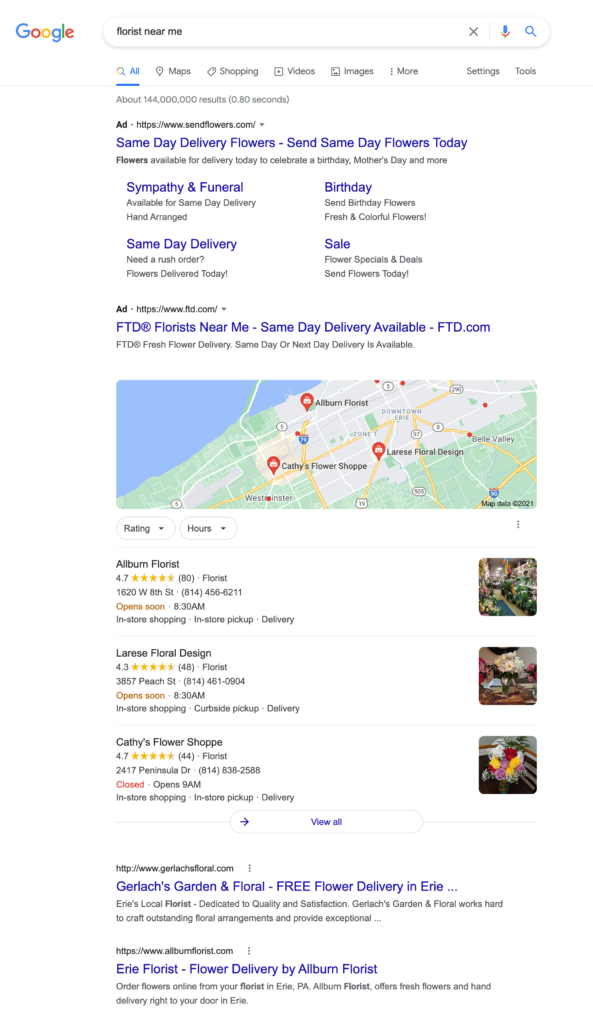
Go to Google and search for the phrases on your list. What types of sites and pages are coming up? This will let you understand a bit more about the searchers intent and how you can update or create better content on your site.
You should do this on both your mobile phone and your desktop as may see different results.
Make a spreadsheet that details what shows up for each search phrase. This will be helpful in the subsequent phases of your local SEO efforts.
Claim and optimize your Google My Business / Bing Places
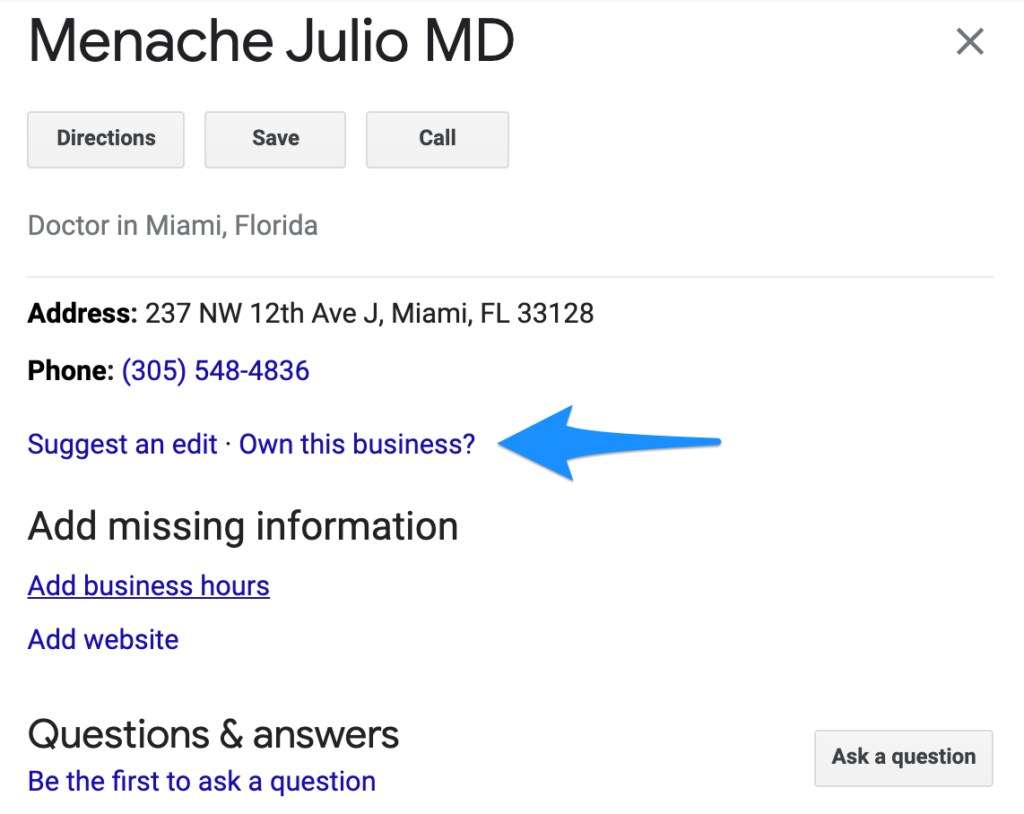
Before we get to implementing your research, make sure you’ve claimed and optimized your Google My Business profile. Google My Business profile data is used to power Google Maps and the local pack which shows at the top of most localized searches. This means if you want to be #1 on the page, you need to be #1 on the map!
If you don’t already have your profile claimed, or you need to create one, head here to get the process started. You will need to wait a few days for the postcard to come in with a confirmation code so you can verify your location, but you can use that time to gather logos, images, and other business information.
You should follow this same process for your Bing Places profile. While Bing has a fraction of the traffic, it is still a search engine used by millions every month, so it should not be neglected. Not everyone uses Google.
Fix any technical SEO issues with your website

Your Local SEO Audit could potentially uncover technical issues that are holding your website back from ranking higher. These could include issues such as:
- Your entire website or certain pages load slowly (use Google Page Speed as a benchmark)
- Your website is not optimized for different screens and browsers, especially mobile (Google has moved to a mobile first index)
- You have web pages that are not included in the search engine index (thus will never be seen by searchers)
- You have web pages with errors, such as 404 not found, that provide a poor user experience
- Your website has links to other websites that are no longer or even other web pages that have moved or been removed.
- You could also be experiencing other technical issues due to bad code, or poorly implemented designs
These are just some examples of common technical issues that we’ve found doing over 1,000 audits. There are many others that may be hindering your performance. Unless you correct them, other changes you may make might not have any affect on your rankings. This is why it makes sense to get a local SEO audit and work with a local SEO expert who can make sure there’s nothing hiding under the covers.
Optimize existing pages and add new ones for missing search phrases

Once you have fixed any technical issues, it’s time to move on to optimizing your website for the search phrases you are targeting. This involves several things:
- Ensuring you have a high quality page for every the main search phrases you are targeting
- Making sure your site is easy to navigate, and that both users and search engines can easily find your content once they land on your site
- Optimizing your page titles and page content for the search phrase it is targeting (I.E. page titles, headers, keyword density, outbound links, etc)
- Interlinking from authoritative pages on your website to other pages that you want to see improved rankings
This is something to wrap it up and transition to the next steps
Promote your website (aka link building)

With any errors (or at least the major ones) fixed and your website updated with optimized content, it’s time for the most important (and hardest) step: link building.
The more high quality (i.e. high authority) links you have to your website overall and specific pages, the higher your website rankings will be. Links are the most important factor when it comes to ranking higher in organic search results.
Link building is no easy task. Getting links to your website takes time. You will need to do research, be creative in your outreach, and be prepared to hear no a lot. Link building is the hardest part of SEO.
Before you begin building links to your website, it’s important to consider the following link classifications:
- High Authority Domain Relevant (HADR) – These are links to your website from a high authority website that is relevant to your niche. An example would be getting a link from WebMD to your website if you were a doctor.
- High Authority URL Relevant (HAUR) – These are links to your website from a page that is relevant to your niche, but the domain is not necessarily relevant to your niche. An example would be getting a link to your HVAC website from an NYT article about HVAC contractors.
- High Authority No Relevance (HANR) – These are links to your website from a highly authoritative source, but neither the page or the domain are relevant to your niche. An example of this would be a link from a popular business blog post on well designed websites, even though you don’t design websites.
- Low Authority Domain Relevant (LADR) – These are links to your website from lower authority websites that are relevant to your niche. An example of this would be a link to your website from a new industry association you joined.
- Low Authority URL Relevant (LAUR) – These are links to your website from a page that is relevant to your niche, but the domain is not necessarily relevant to your niche. An example of this could be a local resource page created by school to help parents find a place to buy supplies.
- Low Authority No Relevance (LANR) – These are links to your website from low authority websites that have nothing to do with your niche. An example of this would be a link from a fishing store to your flower shop website.
In general, and whenever possible, it’s best for you to focus on how you can get HADR, HAUR, and LADR links as these will be the best for improving your rankings. These links will often take the most effort and be the hardest to get. These links also will have the biggest payoff, so don’t give up.
The best place to start your link building efforts is to use a local SEO tool to analyze the backlinks for the pages that already rank for a targeted keyword phrase. For example, if you want to rank for “Florist near me,” you first want to know how many links the existing sites ranking for the term have. This will give you an idea of both difficult and the amount of effort that will be required to obtain the proper number of links.
If you’re just getting started, you may want to focus on less competitive terms in order to get a few quick wins. Over time these quick wins can add up to a lot of traffic, and give you a solid domain authority to then go after more difficult terms.
Once you get an idea of what links the existing pages have, you should create two lists. One list is all of the shared links (or link overlap) by at least two of the sites. These links are often low hanging fruit as they are typically directory or resource pages that are more willing to add a new player.
The second list should be of the unique links that each of the pages has. This second list gives you a “hit list” of prospects from which to figure out how to get links from them. Sometimes you may be able to convince them to replace the existing link with a link to your website (which may require payment). Other times you may be able to suggest adding yours as a way to offer greater choice, or even a way to update the post with new information if you can shed further light on the page’s topic.
With link building lists in hand, it’s time to research and get creative. For each link on either list, go to the page, review what it’s about, and come up with an angle for your outreach. While you’re at the site, grab the main contact information (about us, contact page) so you have this handy for sending an email…or even calling them.
Last but not least is creative outreach. Notice I called it creative outreach. This is because it’s important to be creative in your ask via email. People get link requests all day, every day. Why should they respond to you? It’s really a sale. Think like a salesperson and give them your best pitch!
As the links start rolling in, keep track of them in a spreadsheet or a Local SEO Tool. It’s important to monitor links with software or manually. Pages update and links change all the time. Remember, not all links last forever. Plan to have to build “maintenance links.”
Repeat, repeat, repeat. Until you are number one, keep promoting that page!
Disclaimer: Doesn’t Google “officially” frown upon this? Yes, they do say “don’t build or buy links” (paraphrasing). In reality this is because links are so highly influential. They don’t want you to focus on building links because it works for achieving higher search rankings. Plus, they want you to spend that money on Google Ads instead.
Now, if you don’t want to go the direct outreach route out of unnecessary fear you will get in trouble, then there are other ways to “get links” that aren’t called link building. These include:
- Sponsorships – Sponsor non-profit organizations, community programs, and industry associations. Ask for a link back in return on their donor page.
- Press Releases – While not as effective as they were in the past, putting out a press release and linking to a targeted page can help. It also may allow you to get more of the next two opportunities, since the press still watches these. Plus, these always feel good internally – a chance to celebrate a win with the team.
- Guest Editorial – Use a PR firm (or DIY) to reach out to related publications and offer to produce content for them as an industry expert in exchange for a byline that includes a link back to a page on your website of your choosing. If you can’t write yourself, hire a ghostwriter. This is still a viable way to build links, and your reputation as an expert.
- Expert Interviews – Hire a PR firm (or DIY) to offer you up to media outlets as an expert in your field. The media and press are always looking to speak with a subject matter expert – why not you? This is a great way to get those high authority, highly relevant, links.
If you couldn’t tell by the length of this section, next to your local SEO audit, link building is the most important part of success with local SEO. You can have the fastest website, the cleanest code, with the best content, and still not rank if you do not have enough of the right links. Make link building part of your local SEO strategy and get started with it early.
How long does it take for local SEO to work?
Ah, the question we all want answered – how long will local SEO take?
The best answer is it depends. The two biggest factors are the market and the competition. The larger the market, the more competitors, the harder, and longer it will take to see success. Success is also a variable. Your definition of local SEO success may differ from the next person.
In order to set some general expectations, here are some benchmarks after 10+ years of doing SEO:
- How long before I show up on the map and local pack? If you’re in a small market or industry, this could happen in a month. For everyone else, it usually takes 3 to 6 months of consistent effort to positive movement and 6 to 9 months before you hit the local pack.
- How long does it take to SEO optimize a site? Usually 1 to 12 months, depending on the size of your site. A basic brochure website is one month. Optimizing a site like Yelp could take a year. For many, on-page optimization never stops since they’re always adding new pages.
- How long does it take to get a page one ranking? This depends on the term and how competitive, but for the most part, you should be able to get to the first page with 3 months of solid effort. Obviously if it is a term with tens of thousands of monthly searches it could take 6 to 9 months, maybe even a year.
- How long does it take to get a top five ranking? This again depends on the term and the competitiveness, but similar to getting to page one it can be done in 3 months (or less). Most often a top 5 ranking for a competitive term may take 9 to 12 months, or more.
- How long does it take to get a number 1 ranking? You should probably budget 12 or more months to pursue a number 1 ranking. This is just a loose estimate. It could take much longer, or happen much faster. This is why it’s important to start with a local SEO audit. An audit will help you determine the opportunities available to you and how long they will take in order to achieve them.

